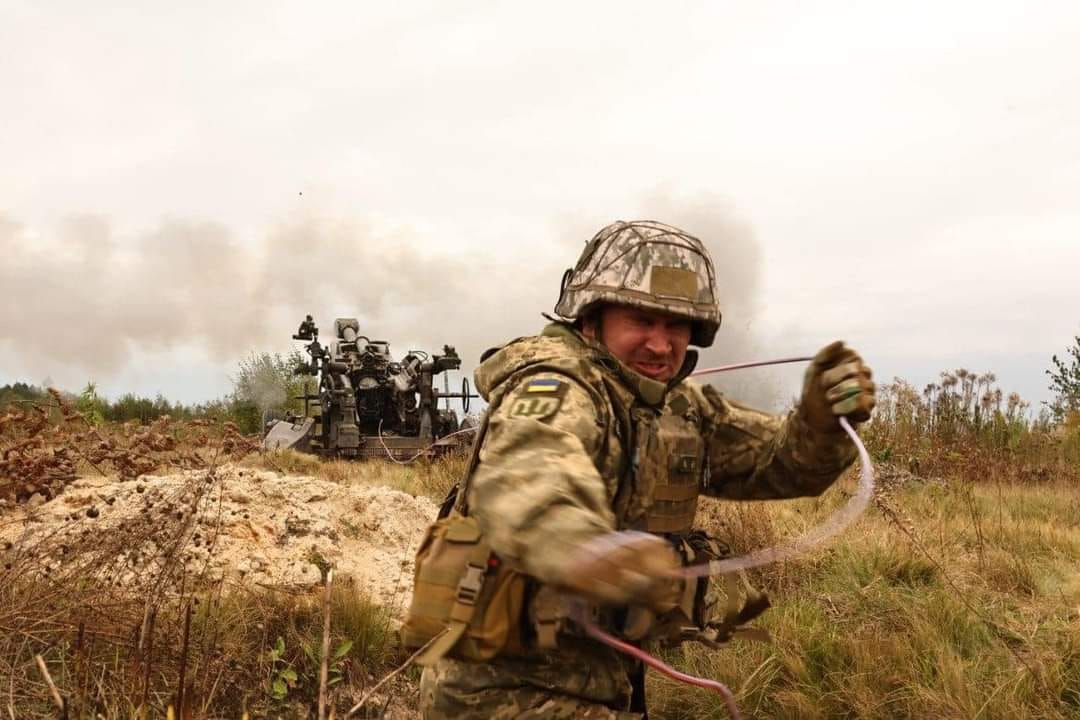As Ukrainian President Zelenskyy promotes a victory plan ensuring Ukraine regains control of its 1991 borders, calls for a Munich-style agreement grow in the West as Russia achieves incremental victories on the frontline. We asked former Ukrainian Defense Minister Zagorodnyuk about the chances Ukraine has to win against Russia and what is missing to achieve that goal and published a detailed interview. Here we bring you Zagorodnyuk's main points.
Ukraine is not winning, but neither is Russia

Despite recent advances in Donbas, Russia's performance in the war remains catastrophic. With over 600,000 personnel lost and 40% of its state budget committed to the conflict, Russia's territorial gains come at an unsustainable cost of approximately 1,500 casualties per day.
Right now, the war is at a strategic stalemate: Russia cannot win, it crawls slowly but their progress, measured in kilometers, falls dramatically short of their strategic goal to destroy Ukrainian statehood.
Truth be told, Ukraine is not succeeding much at the moment, and is not winning because Ukraine’s victory is establishing long-term peace. But calling this a Russian success ignores reality. Russia’s navy presence is diminished to 1/10 of what it was, and even in the land dimension, all is not ideal.
Russia’s regime clearly understands this war is existential for them, and is “all-in.” However, the Russian military machine, despite being one of the world's largest by size and budget, has failed to achieve a decisive victory after committing nearly all its resources to this war.
If any NATO force were to spend half its budget on an invasive war and achieve Russia’s performance, it would be called a disaster.
Despite this, Russia’s propaganda machine is convincing officials, analysts, and journalists that Russia is winning.
The war's evolution created a tactical trap for Ukraine
This war has an unusual setting reminiscent of mid-to-late 20th-century warfare, with the Iran-Iraq war of the 1980s being the last similar example. About 90% of battlefield activities are concentrated in the tactical depth - from zero to 30 kilometers into each side's territory.
The key difference now is UAVs, FPV drones, and electronic warfare, which largely replace traditional artillery and MLRS but operate in the same area.
This leaves the operational depths – hundreds of kilometers behind the frontline – completely free for Russia to set up and recover their forces. While these rear areas were once disrupted by HIMARS, those quantities were limited. Now they're only targeted by precious long-range drones used on high-value targets.
Such a war, where all action happens in the tactical zone, cannot continue indefinitely. Ukraine's largest issue is its extreme exhaustion of personnel, and that setting must be changed. Russia is at an advantage right now, as deaths do not matter for them. But Ukraine can win with fewer people if it can penetrate strategic depths. This is why Ukraine insists on the West allowing long-range strikes into Russian territory.
Ukraine's victory plan is realistic but needs resources
The operational component of Zelenskyy’s victory plan is classified, but some things can be deduced. Ukraine did not have this plan for a long time, and the fact that it has it now is a big plus.
The plan must change the paradigm of the war into more result-oriented operations aimed at liberating territory. Is it possible? Absolutely. Must it be done? Absolutely. The strategy of just holding ground is very weak and won't get us anywhere.
Ukraine’s success is possible, technically and organizationally. But Ukraine critically depends on the west for funding and the provision of critical weapons systems.
Ukraine has already proven its capabilities with three successful liberation operations - Kharkiv (2022), Kherson (2022), and Kursk (2024). Each was different because both sides keep adapting.
Surprise remains possible, as shown by the recent Kursk incursion, though it can't be guaranteed in every case.
To win, Russia’s operations need to start failing and Ukraine’s need to start succeeding. Unlike World War II-style sweeping offensives, victory will most likely come through a chain of serious operations. If they start to succeed, Putin will realize he's losing the war. The question of where it stops becomes secondary -- it's more important to change the course of war.
Three keys to winning operations
Ukraine needs to enable full-scale combined arms campaigns with necessary capabilities. As of late 2024, some long-range weapons and aerial capabilities owned by our partners are competitive, but their future availability remains uncertain.
The key changes needed are:
- Long-range strike capability: No NATO general would claim military success is possible without striking enemy territory. With Russia launching everything from their territory, it's impossible to win without striking Russian territory.
- Air power: Russia uses about 900 gliding bombs per week. Planning without considering air power is unrealistic – no NATO command would plan a modern war without first gaining air superiority or at least air parity.
- New technologies: Including unmanned platforms, electronic warfare systems, AI systems (particularly in autonomous systems and optical recognition). These improve literally every day.
There is no single magic weapon
You don't get some weapon and then win the war. You get a combination of weapons that enable certain types of operations, and then you win the operations. A chain of victories may eventually lead to a political outcome that can be called victory.
Looking at the war's evolution: In early 2022, Ukraine succeeded in liberating half its occupied territory using mainly Soviet legacy weapons. By late 2022, those were largely depleted, and Ukraine began transitioning to NATO systems.
In 2023, we were still using about 50% Soviet-standard weapons, but now the vast majority are NATO equipment - a historic transition.
By the end of 2022, Ukraine had already used quite a few drones, and new operational approaches were evolving. The Russians caught up after initially lagging. It was a fantastic chance for Ukraine to move further, but we didn't for various reasons.
2023 was very different from 2022, and 2024 is very different from 2023.
Looking ahead to 2025-2027, we’re at decisive moments for certain systems. Key questions include:
- Will electronic warfare systems be able to block FPV drone operations? If so, we’ll see one type of warfare focused on electronic warfare.
- If FPV operations can still penetrate electronic warfare defenses and we maintain real-time battlefield visibility, it will be an FPV-dominated war – whoever has better FPV capability will win.
- Will FPV capabilities extend beyond 30 kilometers to hundreds of kilometers?
- What about AI? We’re seeing interesting developments, with immense amounts of data being collected and analyzed in both Ukraine and Russia. This data processing will enable serious computer vision capabilities.
- If these capabilities enable completely autonomous weapons, as many suggest, we’ll see a robotic war that will make current operations totally irrelevant.
NATO support: crucial but insufficient
We have received significant budget support - tens of billions, and altogether hundreds of billions. Without that support, we wouldn't even be able to discuss what we're talking about now. Ukraine would be in an extremely difficult position, and Russian occupation would extend much further.
Many NATO generals, ministers, and civil servants work daily to help Ukraine. Many travel to our country regularly and work with our ministries. The reason Ukraine exists, that 80% of territory remains under government control, and its economy continues functioning is possible only because of their help.
However, we're not on the path to victory right now. Critical political decisions were delayed by escalation concerns. In November-December 2022, the US government seriously believed Russia was ready for nuclear escalation. These concerns are overestimated - being overcautious actually promotes escalation by encouraging Russia to keep playing with nuclear threats.
The West delayed the delivery of ATACMs for over a year and F-16s for over two years. Because of this, Ukraine missed massive opportunities to continue the counter-offensive in 2022 and to do better in 2023. Can Ukraine just blame NATO? No, we have our own issues to address.
Yet, Ukraine still has a chance for a successful outcome, the West has resources to enable a Ukrainian victory, and there are no reasons to not provide Ukraine with the required resources. It’s not a question of resources, but of proper operational and campaign planning.
The myth of Russian invincibility
There is a legend that Russia cannot lose wars because it has so many resources. But actually, it lost more wars than it won. However, they have pushed this legend of Russian invincibility so successfully that many people think it is true.
Take the Crimean War as an example. It was extremely unpopular in the West and the first war broadcast in real-time through telegraph. People in London read daily front-line news about logistical issues, failed battles, and high casualties. Everyone said it wasn't going well, similar to now. Yet by 1856, Russia had no Black Sea Fleet, its regime was near collapse, and the Tsar effectively committed suicide.
What the world needs to understand
This war is much bigger than Ukraine - it's about the future history of the world. The Biden administration understood this from the beginning, emphasizing its historical significance in every justification of support.
When people in the West say they're tired, they should spend a few nights under Russian Shahed drone strikes. Their fatigue from reading news is nothing compared to what Ukrainian people are experiencing.
Many people get information from wrong sources, spreading myths like Ukraine stealing Western money for weapons, which is nonsense since the West provides weapons directly, not money. There hasn't been a single piece of evidence of weapons misappropriation in these three years. Other myths include that Ukraine should cede territory if it’s not succeeding – but it’s not a war about territory. And that Russia cannot lose wars because it has so many resources – which is nonsense, as it has lost more wars than it has won.
What’s often forgotten is that this war is much bigger than Ukraine. It’s about the future history of the world. Many people miss the point that this isn't just about supporting Ukraine because it's suffering. This is about ensuring the world doesn't fall apart – which it will if Russia succeeds.
Read the entire interview here, or watch the video:





